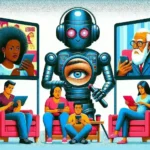Introduction
In an era where technology continuously reshapes our entertainment landscape, Spotify is at the forefront of innovation. Recently, the company announced its pilot program for AI-powered voice cloned narrators in U.S. audiobooks. This revolutionary approach combines the art of storytelling with state-of-the-art artificial intelligence, promising an immersive experience for listeners while also streamlining production for authors and publishers.
The Evolution of Audiobooks
To understand the impact of Spotify’s initiative, it’s crucial to take a step back and examine the evolution of audiobooks. Once limited to cassette tapes and CDs, audiobooks have witnessed a meteoric rise in popularity with the advent of digital streaming platforms. As of 2023, the audiobook industry has grown substantially, reflecting a broader trend of consumers seeking convenience and multitasking opportunities. According to recent statistics, the global audiobook market is expected to reach over $3.5 billion by 2025, signifying a shift in how people consume literature.
What Are AI-Powered Voice Cloned Narrators?
At its core, AI-powered voice cloned narrators utilize advanced machine learning algorithms to replicate human voices. This technology can analyze speech patterns, intonations, and emotional nuances, creating a seamless auditory experience. With this innovative method, Spotify aims to provide a diverse array of narrators, offering listeners unique voices that resonate with specific book genres.
How Does It Work?
The process begins with collecting voice samples from selected narrators. These samples are then fed into an AI model that learns to recreate the narrator’s voice. The result is a voice that sounds remarkably similar to the original, capable of delivering varying emotions and expressions. This technology not only enhances the listening experience but also allows for quicker production times, making it easier for authors and publishers to bring their works to market.
Advantages of AI Voice Cloning in Audiobooks
- Cost-Effective Production: Traditional audiobook production involves hiring voice actors and sound engineers, which can be costly. AI narration reduces these expenses significantly.
- Scalability: With AI technology, Spotify can scale production to include a vast library of audiobooks, catering to a diverse audience.
- Customization: Authors and publishers can select voices that complement their books, enhancing the storytelling experience.
- Accessibility: AI narration can be produced in multiple languages, making literature accessible to a global audience.
Challenges and Concerns
Despite the numerous benefits, the introduction of AI voice cloning raises ethical and practical concerns. Critics argue that this technology could undermine the work of professional narrators, potentially leading to job losses in the industry. Furthermore, there are concerns regarding the authenticity of the storytelling experience; will the emotional nuances conveyed by a human narrator be replicated adequately by an AI?
Ethical Considerations
The ethical implications of AI voice cloning cannot be overlooked. Issues such as copyright infringement and consent arise when using a voice that belongs to a particular narrator. Spotify and similar platforms must navigate these legal waters carefully to avoid potential backlash and legal disputes.
The Future of Audiobooks with AI
As Spotify continues to innovate, the integration of AI-powered voice cloning in audiobooks may set a new standard for the industry. With advancements in technology, we can anticipate even more sophisticated applications in the near future. Imagine personalized audiobooks where the narrator adjusts their voice based on the listener’s preferences or mood, crafting a unique experience for each user.
Predictions for the Audiobook Market
Industry experts predict that by 2030, AI will play an integral role in audiobook production, leading to a more diverse range of voices and stories. This evolution could revolutionize how authors connect with readers, fostering a deeper relationship between the two.
Conclusion
Spotify’s pilot program for AI-powered voice cloned narrators in U.S. audiobooks marks a significant milestone in the audiobook industry. By merging technology with storytelling, Spotify not only enhances the listening experience but also paves the way for a more inclusive and accessible future for literature. As this technology continues to develop, it will be fascinating to see how it transforms the audiobook landscape and the wider implications for publishers, authors, and listeners alike.



